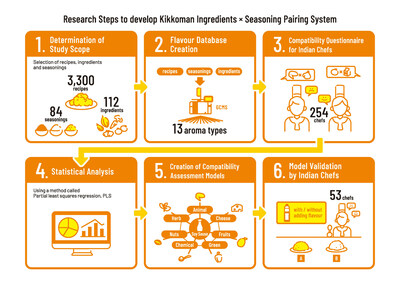Kikkoman applies science to crack the code on which Indian ingredients are best paired with Kikkoman Soy Sauce
The result of the ground-breaking research accelerates the development of localized products to further expand Kikkoman's presence in the Indian market
TOKYO/MUMBAI: Kikkoman announces today the application of science to the question of which ingredients and seasonings in Indian cuisine are best paired with Kikkoman Soy Sauce, a naturally brewed Honjozo soy sauce produced through a fermentation process involving natural microorganisms. A cook’s intuition can often work well to find out which ingredients go well together but Kikkoman, long fascinated by India’s food culture, announces ground-breaking research that will facilitate the matching of Kikkoman Soy Sauce with Indian ingredients and seasonings to further penetrate the soy sauce market in India.
Kikkoman has broken new ground by devising a system called KIP (Kikkoman Ingredients × Seasoning Pairing) which scientifically evaluates the taste compatibility of, say, Indian-style chicken and Kikkoman Soy Sauce, or mushrooms with Kikkoman Soy Sauce.
Interestingly, while chicken and mushrooms might seem like obvious pairings with soy sauce, the research threw up unexpected combinations that worked too, such as the fact that coconut paired well with Kikkoman, and that watermelon paired well with Kikkoman. Importantly, the pairings worked best with Kikkoman Soy Sauce, and not as well with other soy sauces typically found in the Indian market, many of which are in fact chemically produced soy sauces.
Furthermore, this system is not limited to Kikkoman Soy Sauce; it can also evaluate the compatibility of seasonings and ingredients. For example, it can scientifically evaluate how well a combination of seasonings and ingredients of interest, such as basmati rice and tomato ketchup, or coconut and garlic, go together.
The findings were presented at the Food Science and Technology conference held in Valencia, Spain in September, and received a warm reception and attracted much attention.
The KIP system was devised based on the following methods:
- 3,300 Indian recipes were studied to identify 112 ingredients and 84 seasonings commonly used in Indian cuisine.
- The aroma components of these 112 ingredients and 84 seasonings were classified into 13 aroma types based on the FOODPAIRING® classification. In short, a flavour database was created.
- Over 250 professional chefs were surveyed to determine the compatibility of the ingredients and seasonings with Kikkoman Soy Sauce.
- A compatibility evaluation system was developed using the compatibility scores of the ingredients.
- Finally, 53 chefs conducted ‘sensory evaluation tests’ to confirm the validity of the system.
India’s food culture has a long and deep history. Understanding it was one of Kikkoman’s goals when it entered India two years ago. It has now established that it is possible to scientifically identify food and seasoning combinations that are preferred in India.
With this new pairing system, Kikkoman will be able to develop exciting new products designed specifically for certain Indian ingredients and recipes – based not on guesswork or hunches and intuition but on science.
The findings have opened up a whole new field of possibilities, of even more delicious experiences to savour. Kikkoman could develop a soy sauce fortified with aromatic ingredients, for example, that perfectly suits basmati rice. Or develop other variants for many other dishes.
The research will enable Kikkoman to explore new openings for its naturally brewed soy sauce in the Indian market.
Dr Miho Imamura of the Research and Development Division, Kikkoman Corporation who was one of the researchers of the study, called it Kikkoman’s ‘contribution’ to India’s ancient food culture. Dr Imamura commented “Compatibility between foods is often evaluated based on similarity of aroma, but this research is the first attempt in the world to evaluate compatibility from the perspective of ”harmony”, “contrast” and “masking effect” in addition to “similarity” of aroma. By developing our KIP system, which can evaluate compatibility from multiple perspectives, we have made it possible to predict food preferences in India. By adding the essence of the latest science to the developer’s experience, we hope to contribute to creating new “deliciousness” that exceeds the imagination for the people of India” Dr Imamura added.
Kikkoman also worked with TagTaste Foods, an Indian company that provides sensory evaluation and product development support for companies. Jaspal Sabharwal, co-founder of TagTaste Foods, found the study fascinating because it ‘illuminated’ different aspects of India’s culinary traditions.
“The overarching objective is to develop products that seamlessly blend with the small little joys of everyday life and yet come with 100 per cent purity and sensory bliss. Kikkoman’s experience of over three centuries combined with TagTaste’s cutting edge digital research capabilities and understanding of Indian palate exemplify the power of collaboration in developing differentiated products for the Indian market” said Sabharwal.
About FAT2023
The 5th Euro-Global Conference on Food Science and Technology, FAT2023, is the annual conference on food science and technology organized by the Magnus Group. The conference was held in Valencia, Spain, from September 11-13 under the theme of outstanding discoveries in food science and technology. The aim was to highlight key research and applications as well as emerging technology in food science and technology.
About TagTaste Foods
Founded in 2016, TagTaste is a community-driven, digital platform dedicated to revolutionizing the food industry. Its mission is to empower food businesses with customized sensory tools and ethnography, leading to improved financial outcomes and heightened trust among consumers.
About Kikkoman and Kikkoman India
With a history spanning over 350 years and based in Japan, the current Kikkoman corporate entity was established through the merger of eight families in 1917. The company’s internationalization strategy began some 60 years ago with its entry into the United States market. Kikkoman has become a global business, expanding to over 100 countries, with 11 soy sauce production sites worldwide that distribute its products to millions of consumers.
Kikkoman India is solely responsible for importing all Kikkoman products, and manages all production, marketing, sales, and distribution in India.



